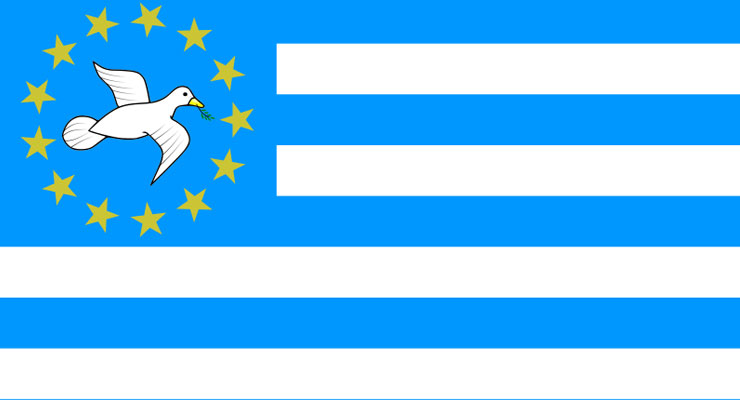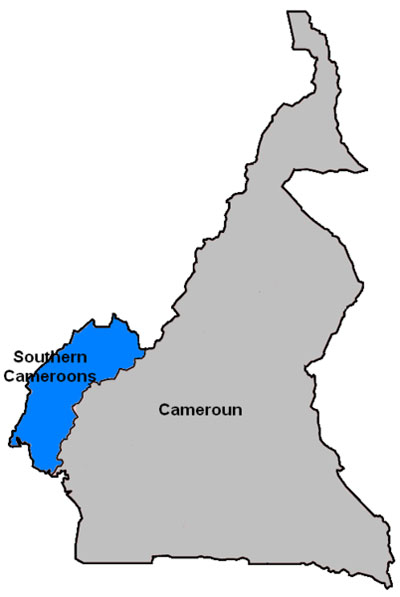
In Nigeria’s capital Abuja on Friday the 5th, January 2018, heavily armed gunmen of Nigeria’s State Security Service (SSS) stormed the Nera Hotel around 8pm and arrested the Interim President (IP) of the Federal Republic of Ambazonia (FRA) and 9 other close collaborators including leaders of the Southern Cameroons National Council (SCNC). It is reported that one other collaborator of the IP escaped arrest only because he arrived the venue late. Initial reports coming from the Communication Department of the Interim Government of Ambazonia (IGA) stated that the gunmen were sent from the Cameroun Republic to abduct the IP and his team. But it is now certain that the SSS is responsible for the arrests. The arrests took place just before the IP and his collaborators could hold a meeting to discuss the situation of their people from Manyu County in Ambazonia who are currently refugees in the Cross-River State of Nigeria.
The FRA is a yet unrecognized State proclaimed as a result of the ongoing Anglophone crisis in the West African country identified as “The Republic of Cameroun” (ROC) in United Nations Resolution 1476 (XV). For over 55 years Anglophones have lived in what is today called “the two English-speaking regions of the North West (NWR) and South West (SWR) of ROC”, an area coterminous with the former British Southern Cameroons (BSC). Recently, many have protested what they have described as systematic marginalization at the hands of the Francophone-led Government of Yaounde headed by indigenes of the former French Cameroun that became ROC on 01 January 1960.
The Anglophones have decried the fact that the more than 50 years old regime of Yaounde exploited their vulnerability resulting from their being expended to ROC by Britain, annexing and absorbing them into ROC in 1961. Since the unification, Yaounde has gone on to treat them as second-class citizens.
The grievances are numerous: including what is apparently a plan to make sure no anglophone ever becomes President of ROC as it is constitutionally organized today. Other grievances include in no particular order:
- The sidelining of anglophones from specific ministerial positions
- The sending of francophone appointees as administrative officers in the Anglophone regions
- The drafting of laws, decrees, circulars, etc. almost exclusively in French
- The treatment of the English Language as a translation in official texts
- The elimination of English from the currency notes and coins
- The management of all resources exploited in the anglophone zone, notably oil and wood, almost exclusively by francophones
- The use of these resources and/or proceeds mainly to develop the the eight francophone regions in ROC today, regions cotermionous with the Former French Cameroun;
- Suspected plans to cede the Cameroon Devlopment Cooperation (CDC), other plantations and swathes of land in the former BSC to Bolloré, a French businessman who has made a fortune in weak Francophone States in Africa
- What appears to be plans to gradually eliminate the English Language from ROC as seen in concerted efforts to eliminate the General Certificate of Education (GCE) from the national education system
- To erode to a finish the Common Law system.
It is in these last two sectors (Education and Law) that Anglophones appeared to still have independent Civil Society representatives and/or organizations. Therefore, the Teachers and Lawyers Trade Unions voiced their disapproval of the destruction and gradual elimination by the Francophone-led Government of ROC of what they had left as culture and identity from British colonial rule. However, as history will forever recall, from the moment these trade unions called sit-in strikes as from November 2016, the government crack-down has been deadly.
This situation has led to the multiplication and intensification of several calls to boycott schools and courts and to observe unique form of protest called ‘Ghost Towns’. These calls have been observed since November 2016 culminating in the protests of 22 February 2017 and 01 October 2017.

Seeking out independence
The date of 01 October is that which the United Nations General Assembly (UNGA) chose in April 1961 as the date on which BSC “shall have attained independence by joining” the ROC. But the protests in the Anglophone regions had led to the creation of a new Governing Council. It is this Council that called the population to demonstrate on 01 October 2017 in a bid to permit it to proclaim the restoration of the independence of the former BSC to become the FRA.
The demonstration did take place but was met by the usual repression from the Government forces, leading reportedly to hundreds of deaths and a refugee crisis in Manyu in the SWR. While there have been clashes between restoration forces and ROC armed forces in Manyu, the common narratives heard from several of 20,000 reported refugees in the Cross-River State in Nigeria seem to consistently state that it is harassment, arbitrary arrests, torture and extra-judicial killings by ROC security and armed forces that have led them to flee from their homes and land. Paul Biya’s Government has denied these accusations, stating that it is the “secessionist-terrorists” of “Ambazonia” who are causing the Manyu people to flee to the Cross-River State in Nigeria.
Whatever the case, after the proclamation of the restoration of independence of BSC/Ambazonia on 01 October 2017, the Governing Council transformed itself into the IGA, Ambazonia being coterminous with the former BSC or today’s NWR and SWR of ROC. The IGA claims it has been making remarkable strides to have Ambazonia gain recognition by other States. It has also continued to call for school and court boycott as well as Ghost Towns.
Nigeria and refugees
The arrest of the Interim President and his team makes the situation even more uncertain. It raises additional concerns as it is feared that the Nigerian Government intends to handover the detainees to the Yaounde regime even though there is no extradition treaty between Nigeria and ROC. Whether this illegal extradition is going to happen or not, it is likely that the crisis situation in Anglophone Cameroon may degenerate further as a result of these arrests.
Several international organizations including the Commonwealth and the UN have made appeals for the Yaounde regime to dialogue will all parties concerned in the crisis. However, if the IP and his team are eventually handed to the Government of ROC, it will be a clear indication that the Biya regime means business in its profusely demonstrated unwillingness to dialogue with any “secessionist-terrorist”. Such an eventuality may further harden/radicalize the separatist movement, possibly leading to an effective implementation of an “an active phase” at term. Democracy Chronicles will keep following this situation.
Leave a Reply